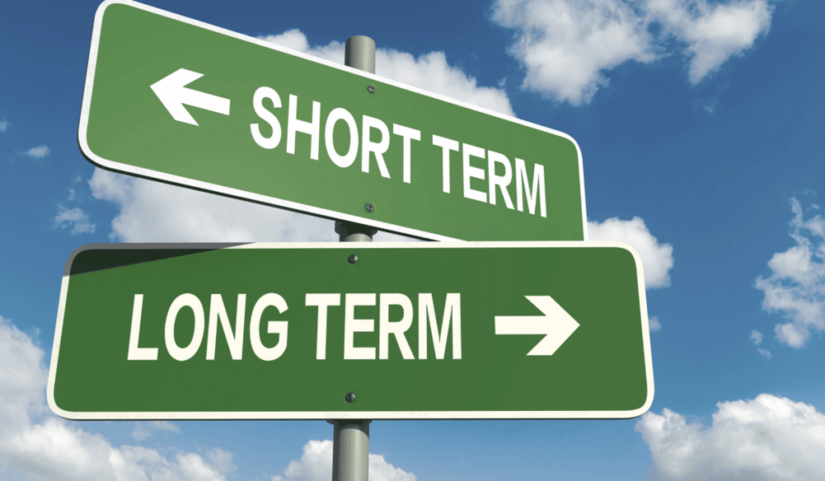Short-Term Investing vs Long-Term Investing: Which is best for you? – that will be the topic of today’s article.
Compare short-term investing vs long-term investing and determine the best approach for your financial goals in your wealth planning.
If you are looking to invest as an expat or high-net-worth individual, which is what I specialize in, you can email me (advice@adamfayed.com) or WhatsApp (+44-7393-450-837).
Table of Contents
Introduction
I’ve mentioned it in many of my previous articles, and yet, I’m going to say it again. Investing for a longer time frame would always be beneficial even though the returns are significantly lower.
I am not completely against the concept of short-term investments. However, my personal opinion is that people should start making more reasonable investment goals and set the necessary time horizon to achieve them.
This article is meant for the people who try to gain more profits by opting for making investments in high-risk investments such as CFDs.
This is why most people (up to 80%) who invest in risky assets such as CFDs usually end up losing a significant amount of their hard-earned money.
Most of them even lose the capital they’ve invested and end up in severe losses making them have to deal with financial hardships for several years of their life.
That’s why, today, I’m going to list out all the aspects related to short-term investments and long-term investments.
This would create a better understanding for the people to decide whether they should opt for short-term investments or long-term investments.
General Information

Investments are of two types based on the time horizon, they are short-term investments and long-term investments.
You might even have heard about medium-term investments, yet it varies from investor to investor depending on various factors.
Such factors include investment goals, specific time-frame, etc.
However, short-term investments and long-term investments mostly stay the same for most individuals.
A short-term investment is usually for an asset you hold ranging from less than one day to one year.
Some investors hold short-term investments for less than a few months at a given time, however even buying and reselling within weeks or days would be considered the same.
Some people, traders, usually trade multiple times within a day.
On the contrary, A long-term investment refers to a situation where you hold for a period of more than one year.
In most cases, long-term investors hold their investments for many years as part of an investment strategy for their portfolio.
As described earlier, short-term investments are investment vehicles that you hold for less than a year.
In general, traders hold short-term investments for no more than a couple of months at the most.
This is done with the objective of trying to make a profit from volatility and short-term gains.
Technically speaking, any asset can be considered a short-term investment, when it has two common features, i.e., high volatility and high liquidity.
In the majority of cases, short-term investments are the most volatile assets with prices moving rapidly.
These price fluctuations are enough for investors to gain profits from any given asset within a short period.
Talking about liquidity, short-term investments are extremely liquid in most cases.
This usually allows investors to purchase and sell such assets quickly and without any trouble.
In layman’s terms, a short-term investment would have higher price fluctuations and the ease of making sales and purchases.
Some of the common types of short-term investments are given below (just to state an example of the type).
— Stocks (day trading)
— Options
— CFDs
All of those mentioned above are volatile assets with liquid markets that allow for rapid and efficient buying and selling.
Common examples of short-term investors are day traders and active traders, who can be seen actively participating in short-term investments.
On the other hand, long-term investments are the investment vehicles you hold for more than a year.
In most situations, investors hold these assets for a couple of years or more at a given time.
Such investments are built into their portfolios while being tailored based on a specific strategy.
Some common examples include (but are not limited to these):
— Real Estate
— Long-term savings accounts (like fixed deposits with tenure of more than a year)
— Bonds with a tenure of more than a year
— Stocks purchased for long term
Just like short-term investments, any type of asset can be deemed a long-term investment.
Long-term investments are generally expected to rise in value in a stable manner, however predictably.
This makes them better financial instruments for an investor to hold for several years.
Mostly, assets with lower liquidity (which means they may take some time to buy and sell) are commonly held as long-term investments.
One of the most common types of long-term investment is an investment made in real estate.
By this, I don’t usually mean passive investments, instead, I’m talking about purchasing the physical asset.
Many individuals purchase houses as an investment opportunity, which will be held by them for a few years.
Some might even hold them for decades, which allows the property to experience capital appreciation.
Some other general long-term investments include investment assets such as mutual funds or bonds.
Long-term investments are usually preferred by people nearing their retirement and others who want to rely on slow and steady long-term growth.
Such people do not want to risk their capital to make the most of their investments.
This is because they do not possess the necessary risk tolerance, which is necessary to handle the risk involved with short-term investments.
Now, having said that about the general definitions, let us talk a few things about investment goals and risks.
Investment Goals

Generally discussing investing goals, when an individual has a long-term goal, then it is wise to go ahead with a long-term investment.
For instance, in order to purchase a house worth, let’s say, $1,000,000, the investor should consider investing in a long-term investment.
This allows them to gain the resources (funds) deemed necessary for their goal, i.e., their house.
A short-term investment would be ideal for investors when they have short-term gains.
For example, when someone required a particular amount of money at a specific time, which can be for buying a car or going on a vacation.
I’m basically referring to the investments that come with a certain level of risk.
Risks Involved
Yet again, the types of investment assets can be categorized into different types depending on the level of risk involved.
It is possible for you to get your hands on a risk-free investment like government bonds or a certificate of deposit.
At the same time, there are certain risky investments such as making an investment in new companies (start-ups).
Generally, such type of a company would often be without a track record or unsecured loans to entities with financial distress.
This means there would be a higher level of risk involved when compared to low-risk assets like bonds.
You should always keep in mind that any investment asset would generally offer higher returns when the risk involved is higher.
As most of you might’ve already heard about this, the risk is proportional to the returns when it comes to investments.
Talking about risks, a common type of risk long-term investors have to face is volatility.
This can also be said as the price fluctuations that take place in the financial markets trigger investments to fall in value.
From the standpoint of short-term investors, the main risk they think would impact them the most is the purchasing power risk, which can also be called the risk related to inflation.
Investment returns cannot make up for the returns while the level of inflation increases, which in turn results in the depreciation of the currency.
Most investors, especially experienced ones, diversify their investment portfolios.
This allows them to have access to both short-term and long-term investments and results in a situation where they can make profits from both endeavors.
Diversification is nothing but the process of mitigating the risks involved by investing in various types of financial instruments.
Let us have a look at a brief example, where we assume that an investor is holding a certain number of stocks in a company.
This has been done with an intention of selling it over a short period of time to make some profits from it.
However, keeping the volatility of the stock market in mind, let us assume that the stock’s sector experienced a fall and he/she was not able to meet their investment goals within the given timeframe.
This would result in a situation where the investor would have to experience losses on the investment made.
But let us imagine the same scenario where the investor simultaneously invested in a mutual fund that focuses on a different sector from the stocks of the selected company.
At such time, even when the sector of the stocks was not performing well, let us say that the sectors in the mutual fund did pretty well.
In such circumstances, the investors would be able to hedge against the losses derived from the investment made in stocks through the gains made from the mutual fund.
In this way, diversification of a portfolio would always come in handy for a person trying to mitigate the risk of having experienced losses in one of their investment assets.
Risk profile

This is yet another factor that determines whether or not a person can benefit from a long-term investment strategy or a short-term one.
Usually, the risk profile of a person is based on two main characteristics, which are their age and their financial situation.
People who are young and have a significant amount of wealth are considered to have a robust risk profile.
This would mean such an investor can handle any type of losses that may occur from the investments they’ve made.
At this point, they could even tolerate the financial situation even when most of the invested capital, if not all of it, is subject to losses.
How is it possible?
Well, a young person has a lot of time ahead of him/her, and this would give them the time needed to regain all the capital they’ve lost by making the investment.
On the other hand, when they have a significant amount of wealth, they can handle the situation as they can make more money and recover the losses from what they have left.
In contrast to such an individual, let us think of a person who is nearing retirement and does not have a significant amount of wealth.
Such an individual becomes less likely to handle their financial situation when their investment is susceptible to losses.
This is because they do not have enough years ahead of them to regain the capital to use for their retirement.
Adding to that, they do not have enough money to regain the capital they’ve lost by making an investment.
However, those who are young, yet do not have a sustainable amount of wealth are also at risk when they lose their capital.
Because such a situation would make it extremely hard for them to cope with the losses they’ve incurred.
Even though they have many years ahead of them to regain the money, they would still have to go through financial hardship, which may not be a good idea.
Yet again, the people who are nearing their retirement are also at risk even when they have the required amount of wealth.
This is because they do not have too many years left to recoup the losses before they reach the age of retirement.
Therefore, it is always wise to go ahead with a long-term investment strategy so that your capital would not be at complete risk.
Which is better for me? Short-term investing or going for a longer horizon?
Based on what I have discussed above, unless having the right type of risk profile, it is suggested to steer away from high-risk financial instruments.
As I said in the beginning, I’m not completely against short-term investments, and it is basically a good idea to have certain short-term investment assets in your portfolio.
This does not mean that you should 80% of your money in risk-prone investments like CFDs.
At the same time, this does not imply that you should only invest in bonds and other secure investments.
Everything should be done in moderation, and this phrase perfectly suits an investment strategy.
My opinion is that a person should allocate more than 40% of their capital to risky investments unless they have the perfect risk profile.
If you are a person who is in another line of work, and not a full-fledged investor, then completely try to avoid short-term investments.
Why? Because most short-term investment opportunities require a person to actively manage their investments.
It is not possible for a busy person to tend to their investment activity all day long while they have other work to do.
In particular, short-term investments like forex, options trading, CFDs, etc., are usually traded for very short time frames.
When you are completely aware of the market situation, you will miss the point where you must have exited.
In other cases, you will panic and exit your position before you start making profits.
One thing to remember here is that panic gets the best of investors, even long-term investors.
Imagine what happens to a short-term trader when such a circumstance arises when they’re not completely aware of what to do.
To make things worse, imagine what would happen when you are in the middle of something important and have to deal with this situation.
That’s short-term trading is only suitable for you when you have the right amount of expertise and the necessary time.
Another major backdrop of short-term investments is that you may miss out on the gains you could have had if you stayed invested for a longer timeframe.
Wait a minute. This does not justify the point that everyone should invest in a conservative manner by completely avoiding risky investments.
Imagine being invested in a bond, and you were only able to get returns of around 4% from it in a specific period.
What if the inflation in that given period went up to 6%? This would mean that your investment wasn’t able to make profits, and you weren’t even able to beat inflation.
In that situation, imagine being invested in a certain stock for a short period, which provided returns of around 10%.
This would allow you to hedge against inflation and balance your portfolio by allowing you to make profits.
This information alone is enough to let you decide whether or not a short-term investment strategy may suit your situation.
Bottom Line
As I said earlier, a portfolio should be balanced as well as diversified, to make the most from your investments.
Through a balanced portfolio of long-term and short-term investments, you will be allowed to hedge against losses that happen within a specific time frame or make profits.
Through diversification, a portfolio would hedge against the losses that can happen with a specific sector or asset class or make profits from them.
Remember that investments usually involved a certain amount of risk, where the higher the risk, the higher the returns, and vice versa.
At the same time, the higher the risk, the higher the chances are for you to lose your money, and vice versa.
Therefore, don’t get yourself into an aggressive investment strategy where you are only into risky short-term investments. This could lead to losses.
At the same time, don’t get yourself too much into long-term investments that are too stable with low risk. This would impact your potential to get returns from your investments.
Having said that, I strongly hope that the information provided within this article was helpful to you in deciding which should you choose, i.e., long-term investments or short-term investments.
All the information provided in this article is for educational purposes only and this should not be considered actual financial advice.
Only a financial expert would be able to determine the right type of investment strategy that suits you.
This is done by such a profession based on various aspects of your scenario such as your risk profile, financial situation, investment goals, etc.
Some people, as I described in this article, do not have enough time to tend to investment-related activities.
When some people do have free time at hand, they might have the right type of knowledge to efficiently handle their investment assets.
If you do not have the right type of knowledge or time, then you have come to the right place.
I am known to offer top-notch investment services for my clients which will allow them to attain financial freedom.
I specifically offer tailored wealth management services as well as investment services to high-net-worth clients, especially those who need someone to handle their assets robustly.
Feel free to contact me to find out whether or not you can benefit from the best-in-class financial services that I offer.
Pained by financial indecision? Want to invest with Adam?

Adam is an internationally recognised author on financial matters, with over 760.2 million answer views on Quora.com, a widely sold book on Amazon, and a contributor on Forbes.



